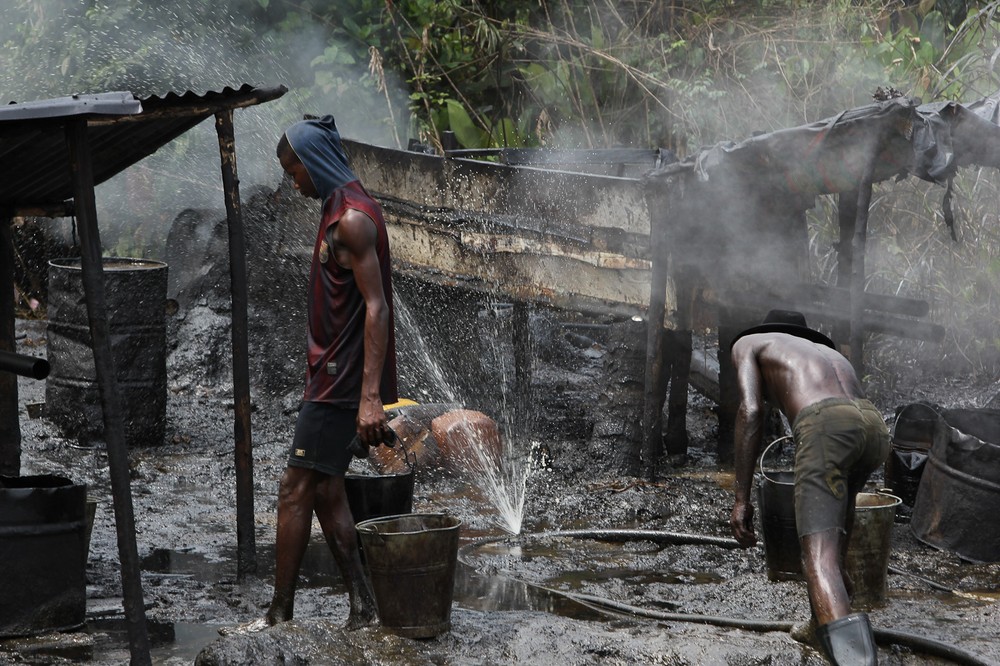Crude Theft: Nigeria Mulls Repossessing Oil Pipelines From IOCs

Following the enormous amount of revenue lost by the Nigerian State to the menace of crude theft, the country is now considering repossessing critical oil pipelines from operating companies, e360 has learnt.
Governor of Edo State, Mr Godwin Obaseki, made this disclosure in Abuja on Tuesday at a Policy Dialogue on Stemming Oil Theft in Nigeria, organised by Nigeria Extractive Industries Transparency Initiative (NEITI).
While presenting the keynote address at the event, Obaseki who is also Chairman of a committee set up by the National Executive Council (NEC) on oil theft, said his Committee, which is now a standing committee at NEC, has discovered disturbing trends in the entire crude theft value chain, which compelled it to recommend to the federal government the need to repossess the assets temporarily from the oil companies.
He said, “We suggest that if it is possible, the federal government should consider leasing or repossessing these lines from the current owners for a short while until we understand what is going on. And working with them to put in place some security arrangements and an infrastructural development plan for these lines.”
Speaking further he said, “Having taken over these lines, we should have proper transparent surveillance contracts because what we find is a whole plethora of contracts; every line operator has a surveillance contract and the variance and operations of these contractors is so wide and difficult to monitor.”
The Governor said it is disturbing as to why the variance in which the nation is massively losing crude to theft in some lines whereas some other lines are much more effectively policed. He said the Nembe trunk line, trans Niger line and the forcados line are most notorious for theft.
He explained that what was more interesting is the findings that the largest losses came from lines that were owned and operated by the same companies who explored, had production and owned the transportation lines, while lines that were outsourced to third parties recorded the least losses.
“So there is a very interesting correlation between the ownership production into the lines and the level of losses on those lines,” Governor Obaseki pointed out.
According to him, the situation have lingered because submissions reviewed from the various parties, including the JTF, communities and oil companies, showed a clear absence of proper governance for the pipelines such that no one is held accountable when breaches occur.
“When breeches are reported, when products are lost, we just deal with the financial losses to the operators what happens to government? Nobody is ever held accountable, nobody is brought to order,” Obaseki said.
He noted that the inadequate prosecution of culprits is an incentive for the illicit business to thrive. “Looking through the law we couldn’t find any concrete evidence of people who were caught, prosecuted and convicted on the crime of stealing crude product,” he said.
As a result, he said his committee has recommended to the Federal government To ensure more clarity on the state actors who are responsible for investigation and prosecution as well as train special judges to handle the cases of oil theft and to also consider setting up special courts to try offenders.
He added that a recommendation of a proper governance structure for strategic pipelines has also been presented to government, emphasising that the lines, despite being owned by individuals, carry products that sustains the life of the country and as such can’t be dealt with as private properties of companies.
Presenting highlights of NEITI’s policy brief on oil theft, Executive Secretary of the agency, Mr Waziri Adio, said between 150,000 to 400,000 barrels per day is lost to theft.
In the first half of 2019 alone, Waziri said, 22milion barrels valued at $1.35bn have been lost to oil thieves. This figure he said, represents about 5% of the country’s 2019 budget. He added that the figure is higher than the combined budget for health, education, defence and agriculture in 2019.
Speaking further he disclosed that data from NEITI audit reports shows that $41.9bn have been lost to crude theft between 2009 and 2018. This he says translates to $11.47m daily, $349m monthly and $4.19bn annually.
Also speaking, the Group Managing Director of the Nigerian National Petroleum Corporation (NNPC), Mr Mele Kyari, who was represented by the Chief Operating Officer, Upstream, Mr Roland Ewubare, said the combination of crude theft, illegal refineries and pipeline vandalism has continued to pose a challenge to the country due to the presence of illegal markets for the stolen products.
He said the NNPC recorded 45,347 pipeline breaches between 2001 and 2019. These he said often includes loss of lives, revenue, jobs, livelihoods of communities and damage to the environment.
He further recommended redesigning the current security architecture, broadening regulatory environment, host community sensitisation, while emphasising on good governance at all levels of the country, as a way to stem crude theft.





























